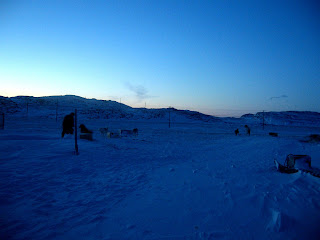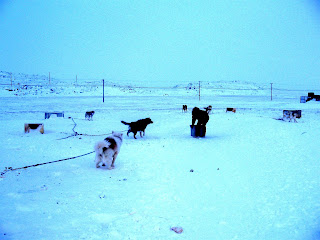
Three weeks after the deadly fire that leveled an entire residential apartment block, the bodies of two missing people were finally recovered from the frozen wreckage. With the help of DNA testing and dental records, the bodies were identified as Andrew Papatsie, 27, and Connie Papatsie, 25. They were the adult children of Sarah Papatsie, a medical interpreter who was attending Arctic College to upgrade her training. A bilingual funeral service for the two victims was held on March 18 at Iqaluit's Cadet Hall. From the local media, three hundred people attended the service.
I haven't heard much about the survivors lately, but I can only assume that they are living well and recovering. I don't think anymore donations are being accepted because the last time I asked, I was told that there was an overflow. The cause of the fire is still under investigation but the authorities are worried that a new deadly trend is sweeping Iqaluit: adult fire-starters. In the past, fires were mostly the result of children playing with matches. Some of the contributing factors to adult fire-starters are: carelessness, alcohol, and aging infrastructure.
I felt that this past week moved at a slower pace because it was a full week of school . . . almost. If you recall from my previous post, the week of the 12-16th was really short because of the three-day in service at the beginning. Midterms were on the minds of every student because they were just two weeks away. For some, they had to write their midterms this week because they were participating in next week's school trip to Australia & New Zealand.
The next assignment for my Grade 9 guitar classes is to perform a short duet piece with a partner. I'm aiming for them to be ready on the first week of April. For Grade 11 English, we continued reading Of Mice & Men, understanding the plot and analyzing the characters. As an added bonus, we looked at writing resumes & cover letters. I did this because there was an upcoming Career Fair on Friday. Near the end of one English class, the upcoming Australia/New Zealand trip was brought up. Since I had been to both countries in the past, I explained what life was like, and how it felt to skydive twice in New Zealand. Since I had my laptop with me, I showed the students photos of my first jump. For junior & senior music, the week mainly consisted of practicing new & old pieces and giving them time to prepare for their midterms.
I took my first sick day on Tuesday because I had a headache and was feeling disoriented. After notifying the principal, I still had to make my way to the school to write teaching notes for the supply teachers. While I was writing my notes, the fire alarm sounded. Nobody had told me that the fire department was testing the alarm. The loud ringing only made my headache worse. Thankfully, I managed to finish writing the notes and make it back to my apartment where I slept until the late afternoon. I felt much better on Wednesday.
For Friday's Career Fair, several prospective employers (First Air, Services Canada, Armed Forces, etc) came to Inuksuk, handing out flyers, job applications, and spoke about what kind of workers they were looking for. From my observations, the table that was looking for summer camp counselors got the most attention from students. For lunch, the students in the home cooking course made delicious chili and salad for everyone.
Until Friday afternoon, everyone thought that there would be a full week of school. While I was organizing my office, an announcement came over the PA, stating that afternoon school would be cancelled because the city was halting the busses due to strong winds. Looks like everyone got a two & a half day weekend.
On the air cadet front, the drum line currently stands at four members. So far, they have been learning basic drum rudiments & rhythms. Next Saturday, I'll be teaching them drum maintenance. The cadets appear to be having a fun time learning marching percussion.
The weather in Iqaluit has been surprisingly chilly for the last several days, mostly due to strong winds blowing from the bay. More than once I had to walk around town wearing a face mask and ski goggles to protect my face and eyes. I felt like an astronaut wearing a spacesuit. Since I live in the town centre, there's no need for me to take a cab or buy a car. Everything is within walking distance. And walking is my exercise. On a school day, I wake up at 6am and leave after 7am. Rather than take the main road that circles around the plateau where the school is situated, I walk up a snow covered hill with my knapsack and laptop case. When I reach the top, I catch my breath and turn around. Gazing at the town below reminds me where I am. From there, I proceed to my classroom and set up for the day.
Sunday (today) was my second time playing organ for the local Anglican church. I practiced as much as I could and gave the congregation my best performance. It was good, they said, but recommended that I hold down the keys a millisecond longer because it sounds like I'm playing a harpsichord.
And finally, the north has been awash with news that the Cultural Property Export Review Board has directed the Border Services Agency to issue an export permit to a Norwegian group that wants to raise the Maud, a sunken ship, and tow it back to Norway. The Maud, named after Queen Maud of Norway, was built in 1916, and was sailed through Canada's Northwest Passage by famed Norwegian explorer, Roald Amundsen, between 1918 & 1924. The ship was sold by Amundsen creditors in August 1925 to pay off the large debts he accumulated from his expeditions in the North and South poles. The ship was purchased by the Hudson's Bay Company which renamed her Baymaud. She was to be used as a supply vessel but was frozen in ice at Cambridge Bay in 1926. There, she sank in 1930.
The project calls for the wreck to be raised, placed onto a barge, and then towed to Norway, 7,000 kilometres away. There, she will be put on display in a new museum in Asker, a suburb of the city of Oslo. The Norwegians are looking to begin the project in the summer of 2013 and is expected to be completed sometime in 2015. Good luck!













